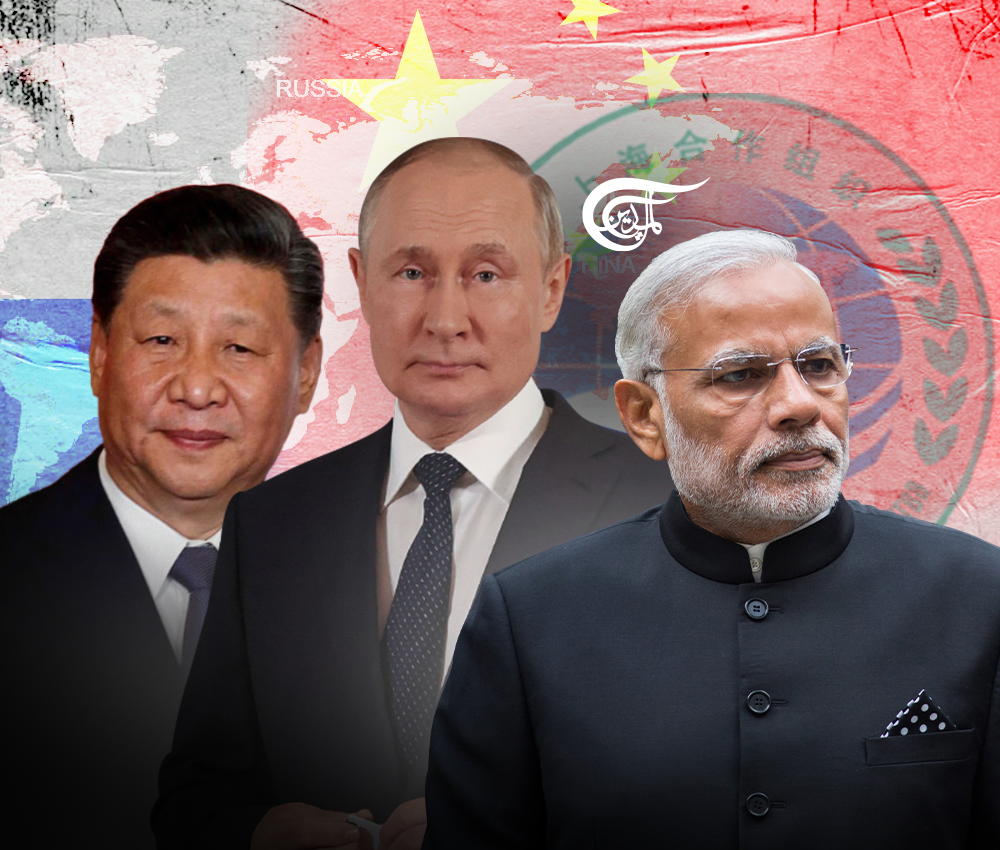How far will the SCO solidarity bring India-China relations along?
Although leaders of SCO countries have different attitudes and strategic calculations, they all speak for mutually beneficial cooperation within this nine-nation economic and security bloc.
The just concluded 22nd meeting of the Council of Heads of State of the Shanghai Cooperation Organization (SCO), held in the historic city of Samarkand, Uzbekistan, has ushered in a new promise of a united fight against the COVID-19 pandemic, cross-border terrorism, rising de-globalization trend while enhancing SCO solidarity and building a stable, harmonious world with a shared future.
Although leaders of SCO countries have different attitudes and strategic calculations, during the two-day summit running from September 15 to 16, they all speak for mutually beneficial cooperation within this nine-nation economic and security bloc that has become a global voice in regional and international affairs since the bloc's formation in 2001.
As Chinese President Xi Jinping pointed out about the SCO's growing role in global affairs from security to development: “The SCO, as an important constructive force in international and regional affairs, should keep itself well-positioned in the face of changing international dynamics, ride on the trend of times, strengthen solidarity and cooperation and build a closer SCO community with a shared future.”
Significance of Samarkand SCO Summit
Against the atmosphere of Russia-Ukraine military tension, this year's SCO leaders' summit assumed importance for more than one reason. First, it was the first in-person discussion of SCO heads of state in three years since the start of the COVID-19 pandemic in 2020. Second, this marked the first trip abroad to Kazakhstan and Uzbekistan by President Xi Jinping since the pandemic began. Commenting on Xi’s first foreign trip, China’s Foreign Ministry spokesperson, Mao Ning said on September 13: “This is China’s most important event of head-of-state diplomacy on the eve of the 20th National Congress of the Communist Party of China, which shows the high importance China attaches to the SCO.”
Third, this summit provided an opportunity to Russian president Vladimir Putin to tell the world how the Western countries have been imposing unfriendly actions against Russia in the economic sphere after his country’s “special military operation” in Ukraine in February. Undoubtedly, Putin’s sharing the world stage with other SCO heads as well as his bilateral meeting with President Xi and Indian Prime Minister Narendra Modi at the SCO summit sent a strong signal to the Western world that Russia cannot be isolated despite the US-led Western sanctions against Russia which has greatly accelerated the food and energy crisis in many parts of the world.
India-China ties under spotlight
However, the limelight of the Samarkand SCO Summit was on the leaders of the world's first and second populous countries - President Xi and Prime Minister Modi. This summit provided a golden opportunity to the two state leaders to come face-to-face for the first time since the unfortunate Galwan Valley clash of 2020 between the Indian and Chinese militaries at the western section of the China-India boundary. There is no denying that the 2020 border conflict and the subsequent gathering of soldiers of both armies on the Ladakh border have cooled Sino-Indian relations recently, severely impacting business and people’s outlook on both sides.
Against the backdrop of dwindling Sino-Indian relationship, diplomatic analysts and common people of both countries sincerely hope that a one-to-one meeting between Modi and Xi Jinping can solve the problems through mutual discussions so as to guide a better and more stable development of Sino-Indian ties which is the need of the hour.
However, although there was no one-on-one meeting between Xi and Modi in Samarkand due to the two leaders’ packed schedules, the Modi-Xi Jinping handshake and the group photo of SCO leaders indicated that a top-level meeting in the coming days is only a matter of time now. Encouragingly, PM Modi was seen standing next to President Xi among the heads of state present at the summit. No one disputes that a Modi-Xi meeting might result in enhancing both economic partnership and diplomatic relations between the two countries.
It should be mentioned here that just prior to the Samarkand SCO summit, troops from the Indian Army and China’s People's Liberation Army (PLA) completed the disengagement process in the Gogra Heights-Hot Springs area in the eastern Ladakh sector on September 13, according to both Indian and Chinese media reports. Needless to say, the disengagement process at the friction points on the line of actual control strongly indicated that both countries are eager to reset the Sino-Indian relationship which is the general expectation of the people of the two neighboring countries also.
Modi and Xi take 'cautious steps' in Russia-Ukraine dispute
It is clear that China and India are getting closer than before, as the leaders of the two countries emphasized from the SCO stage mutual cooperation in the context of the COVID pandemic and the Russia-Ukraine conflict. The Modi-led Indian government refrained from voting on several resolutions brought by the US-led Western world against the Russian operation in Ukraine in the United Nations Security Council, General Assembly, and Human Rights Council. Despite being a part of the Quad, an alliance with the US, Japan, and Australia, India didn't condemn Russia's military operation in Ukraine directly.
But during his bilateral talks with the Russian President, Modi once again conveyed India’s ‘anti-war’ stance to Putin and urged him to end the military operation in Ukraine and return to the path of dialogue. According to media reports, Putin also promised that the war would be ended as soon as possible.
Like Modi, President Xi Jinping in his speech also said that the SCO member countries should work together for mutual cooperation and development. It seems that both Modi and Xi took cautious steps in connection with the Russia-Ukraine conflict now. During the meeting between President Xi and President Putin on the sidelines of the SCO summit, both leaders spoke highly of their growing partnership in defiance of the West. Xi said China was “ready to work” with Russia on demonstrating the “responsibility of major powers”, while Putin criticized US’ role in China’s Taiwan and reiterated his support for the “One China” principle.
So far, China has also abstained from voting on every resolution against Russia at the UN. But the Chinese President did not say a single word in favor of the Russian military operation of Ukraine on the international stage of Samarkand. Rather, he advocated for restoring peace and stability in the international unstable situation by holding high the banner of the Shanghai Spirit. Following the meeting with Putin, Xi called on Russia to “assume the role of great powers and play a guiding role to inject stability and positive energy into a world rocked by social turmoil." According to a BBC report, it is learned that Putin also acknowledged China’s “questions and concerns" about the situation in Ukraine. This is an indication of Russia’s realization of the need to effect a ceasefire and dialogue.
Asia's voice will be stronger if India and China speak in one voice
India will host the SCO summit next year. However, even if the bilateral meeting between the two leaders didn’t take place this time, President Xi took the stage after PM Modi's speech at the main meeting of the SCO. President Xi in his speech said that China will stand by India in organizing the conference.
India needs to ensure the participation of all SCO members including China and Pakistan, despite the continuing border tensions. The development of India-China relations is important to the strength of the SCO family. It is hoped that the Modi-Xi bonhomie that was seen earlier in the swing on the Sabarmati Riverfront in 2014 or a boat ride on the East Lake in Wuhan in 2018 or the relaxed stroll in the historic Mamallapuram city in 2019 will once again bridge the yawning gap in the derailed India-China ties with mutual respect in order to achieve “Asian century”, leaving aside their “historical baggage” over the boundary.

 Rabi Sankar Bosu
Rabi Sankar Bosu
 8 Min Read
8 Min Read












